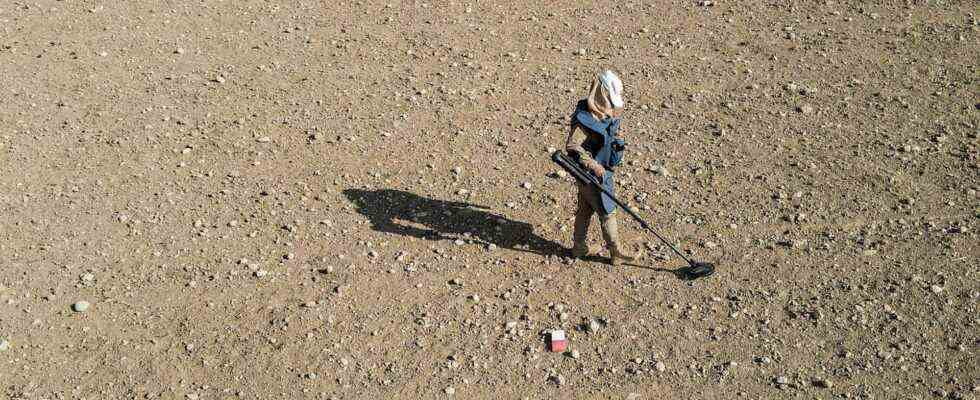world mirror
Status: 02/20/2022 11:19 am
Hardly any other country in the world is as burdened with mines, grenades and rockets as Iraq. But clearing is time-consuming and expensive. This creates new suffering and new victims who have trouble getting hold of the simplest prostheses.
Mohammed Muaisser wanted to go football with his friends, he was already wearing his tracksuit. But then the only cow in the family escaped. His father, Mouyasser, quickly got into the car to catch her again. Mohammed wanted to help, jumped into the passenger seat. It was his undoing.
On a dirt road, the car drove over an explosive device that detonated directly under Mohammed’s seat. “It was a huge explosion,” the father recalls. “Both of Mohamed’s legs were ripped off.”
Mohammed lost consciousness, struggling to die. His father took him to a clinic. Doctors saved his life but not his lower legs.
“I miss my old life very much,” says Mohammed today, ten months after the accident. The 18-year-old dreamed of a career as a soccer star. A dream that has now burst. “I would love to play football again. Watching my friends play it hurts.”
Iraq: If war is deadly even after its end
Daniel Hechler, ARD Cairo, Weltspiegel 6:30 p.m., February 20, 2022
What IS left behind
The deadly legacy of war still lingers in Ninewe Province. Five years ago, Iraqi forces with US support defeated the terrorist militia “Islamic State” (IS) here. Thousands of shells and rockets fell on the provincial capital, Mosul. IS fighters mined them.
Many of these explosive weapons have now been cleared, but by no means all. The surrounding area is still considered contaminated. Nearly nine million Iraqis live among the deadly remains. Hardly any other country in the world is so heavily burdened with mines, rockets and grenades. The south mainly because of the Gulf War against Iran in the 1980s, the north because of the fights against the terrorist militia IS.
An “Unknown Enemy”
Detecting and disarming explosive devices is an expensive, time-consuming, but above all dangerous mission. “We’re working against an unknown enemy, never knowing exactly where he is,” says Shorsh Kassem of Handicap International. In Iraq alone, clearing explosive devices costs around 150 million euros a year.
It may be years before the country is relieved of the burden. But time is pressing. “If we don’t finish our work in the next ten years, people in the high-risk areas will continue to die and lose limbs,” says Kassem.
Knowledge that is essential for survival: near Mosul, the employee of an aid organization explains to young people how they can recognize explosive weapons in the ground.
Image: AFP
Prostheses with the simplest means
It hits almost exclusively civilians, including many young people and children who want to play outside. In a rehabilitation center in Mosul, victims can receive prostheses. It is the only point of contact in the province. Four new patients seek help every month.
The technicians assemble the prostheses with the simplest of means. Money is tight, as is qualified staff. “In the beginning we didn’t have any technicians at all,” says the head of the center, Ghanem Ahmed. They would have to train many more technicians and need better materials for the prostheses.
The prostheses in the rehabilitation center in Iraq are heavy – and there is a lack of trained staff.
Image: ARD Cairo
A heavy load
Mohammed also learned to walk here again. He received prostheses, physiotherapy, a lot of encouragement. Now he is much more independent, but limitations remain. The prostheses weigh 3.5 kilos, don’t fit well and often hurt him. To this day, he cannot walk long distances.
He fights his way back to life with difficulty. However, he cannot fulfill his role as the eldest son of the family. “I sit around most of the time,” he says. “I can’t work, although it’s actually my job to support my brothers.”
Therapist Younes helps Muaisser navigate his new life and keep track of his progress.
Image: ARD Cairo
“I only lost my legs, others their lives”
Finding new courage to face life was difficult for Mohammed at first. And yet he pulled himself together, fought back to life, is looking ahead again – also thanks to many conversations with his therapist. “It motivates him when he realizes where he started and where he is now,” says Ikbal Younes of Handicap International. “It’s so important for his mental state and it makes him stronger.”
And yet it seethes in him. He blames the warmongers who ruthlessly bomb and mine residential areas for his suffering and that of millions of other civilians around the world. “They destroy and kill constantly,” says Mohammed, visibly upset. “Others lose their lives. I only lost my legs.”

